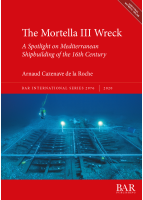Description
During the Renaissance period, Mediterranean shipbuilding—particularly Italian—was renowned for its quality. But it is largely unappreciated today due to the scarcity of written sources and the lack of archaeological documentation. The discovery of the Mortella wrecks in Saint-Florent, Corsica, in 2005–2006, and the 2010–2019 excavation of the 16th century Mortella III, helps to fill these gaps. The main objective of this archaeological study is to identify ‘technical fingerprints’ and ‘architectural traits’ that could contribute to the formulation of an Italo-Mediterranean shipbuilding model from the early modern period. The analysis is based on comparisons with archaeological data from other wrecks of the period as well as written sources. Finally, literature research allows us to link the Mortella wrecks to their history, that of Genoese ‘navis’ sunk during the Italian wars of 1527, complementing the archaeological study with historical research.
AUTHOR
Arnaud Cazenave de la Roche is a researcher at the Consejo Superior de Investigaciones Científicas (CSIC) with a research grant from Marie Sklodowsca-Curie Actions (Horizon 2020 EU Programme). He has been studying naval architecture from the Renaissance and modern periods for several years. He is an associate member of the Laboratoire d'Histoire et d'Archéologie Maritimes (FED 4124) at the University of Paris-Sorbonne where he defended his doctoral thesis.
REVIEW
‘This is a detailed and well-set-out excavation report with high-quality illustrations. But it is more than that. Its starting point is to record in full and accurate detail the nature of these well-preserved ship-remains, and to consider the processes of construction. This it achieves admirably. From this it goes on to place data in their wider historical and archaeological contexts, emphasizing similarities and differences in ships built at different times and in different places. It is a must-have book for archaeologists and historians who are interested in these things.’ Colin Martin, International Journal of Nautical Archaeology, Vol 50, 2021
‘The quality of both archaeological and historical data is excellent.’ Prof. Sylviane Llinares, Université Bretagne Sud
‘Le travail présenté par Arnaud Cazenave de la Roche est vraiment original.’ Dr David Plouviez, Université de Nantes











